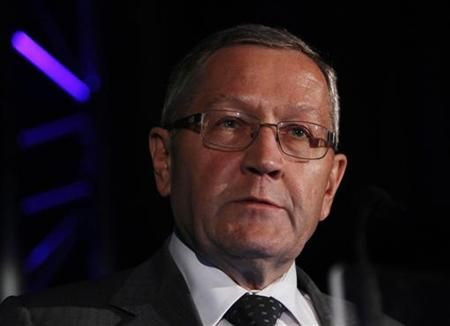Eurozone Bailout Fund Chief Courts China Investment

The head of the European Financial Stability Facility sought to entice China on Saturday to invest in the bailout fund by saying investors may be protected against one-fifth of initial losses and that bonds could eventually be sold in yuan if Beijing desires.
Klaus Regling was in China to persuade Beijing to fork over money to help the Eurozone beat its two-year-old debt crisis. He said the EFSF might invest in a special-purpose vehicle and absorb the first 20 percent of losses.
Regling did not say whether China had asked for that degree of protection and declined to comment on his meetings in Beijing. But he said he expected to submit a proposal on how to scale up the 440 billion euro ($623.7 billion) EFSF by next month.
Expanding the EFSF to 1 trillion euros is key to the Eurozone's latest crisis-fighting plan, put together at a Eurozone summit this week. Details on how this would be done have yet to be finalized, and European leaders are under pressure to show the plan would work.
The EFSF will take a certain tranche that will be a junior tranche, which means if something goes wrong, the first loss will be carried by the EFSF. It could be around 20 percent, Regling told students at Tsinghua University.
Regling, CEO of the EFSF, said the fund could sell bonds in yuan in the future if Beijing so desired. But he said that would be difficult to pull off right now.
We have so far only issued euro bonds, but we are authorized to use any currency we want if it seems efficient, he said.
It also depends on the Chinese authorities, whether they would approve that. I think it is probably more difficult. But I could imagine that over the years it might happen.
Why China Should Bite
Regling was visiting cash-rich China two days after Eurozone leaders struck the deal to boost the firepower of the EFSF, recapitalize banks, and reduce Greece's crippling debt burden.
French President Nicolas Sarkozy immediately got on the phone to China after the summit to seek financial help, saying Beijing had a major role to play.
Europe has said the EFSF may be expanded either by offering insurance to buyers of Eurozone debt in the primary market, or via a new special-purpose investment vehicle that it hopes would draw funds from China and Brazil, among other countries.
The deal has left major economies Italy and Spain under pressure. Italy's borrowing costs jumped at a bond auction on Friday. Prime Minister Silvio Berlusconi was forced to promise reforms to quash speculation that his government was about to collapse.
Regling made clear he wanted to determine what it would take for Beijing to put more money in the EFSF. But he hinted it was also in China's interests to have a healthy euro and an alternative to the dollar as a reserve currency.
Many particularly large economies in the world want to have ... the euro as part of the international monetary system. That is a good reason to support our program, Regling said.
When asked why Beijing should buy more euros and risk currency losses if the bloc launches another round of quantitative easing, Regling said the European Central Bank had been prudent in growing its balance sheet, compared with the U.S. Federal Reserve and the Bank of England.
I can assure you should invest in the euro -- this is not the problem, he said. The ECB has only one objective -- price stability -- and they will deliver.
Stuck with elevated inflation, China worries that ultraloose monetary policies abroad will further stoke price pressures at home. It has repeatedly scolded the United States for its quantitative easing, deeming it irresponsible.
Beijing Cautious
Some analysts agree China has far more upside than downside in providing support for Europe, not least in protecting its global trade. But it may drive a hard bargain to part with some of its $3.2 trillion foreign exchange reserves, the world's largest.
Nonetheless, Beijing is cautious. Although China has expressed confidence that Europe can survive its crisis, it has made no public offer to buy more European government debt.
The careful stance was underscored on Friday by Vice Finance Minister Zhu Guangyao, who said Beijing was awaiting details on new investment options for the EFSF before deciding its next move.
Regling also acknowledged China would take no hasty decisions and said he expected no concrete outcome from his visit.
He shrugged off any notion, in his discussions with students, that the Eurozone project could unravel, saying that the currency bloc remained united.
There is no political intention to kick out any country, he said. It would not be in the interest of any countries, not economically, not politically.
(Editing by Jacqueline Wong and Ron Popeski)
© Copyright Thomson Reuters 2024. All rights reserved.





















